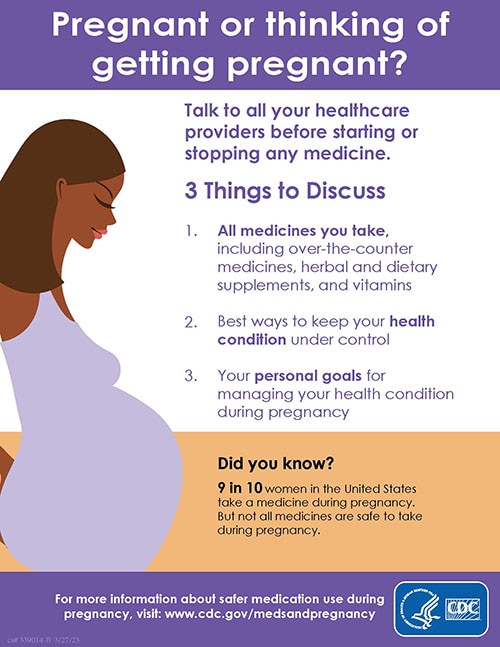Facts about Medicine and Pregnancy
Medicine and Pregnancy Basics in American Sign Language
Are you pregnant or thinking of getting pregnant? Talk to your healthcare providers before starting or stopping any medicines. Be sure to discuss the following with your healthcare providers:
- All medicines you take, including prescriptions, over-the-counter medicines, herbal and dietary supplements, and vitamins
- Best ways to keep any health conditions you have under control
- Your personal goals and preferences for the health of you and your baby
What We Know
Medicine use in pregnancy is common. Almost all pregnant people face decisions about taking medicines during pregnancy. However, we know little about the effects of taking most medicines in pregnancy because pregnant people are often not included in studies that determine the safety of new medicines. We do know
- 9 in 10 women report taking some type of medicine during pregnancy, and 7 in 10 report taking at least one prescription medicine. From 1997-2018, the proportion of women that reported taking at least one prescription medication in the first trimester increased 35%.1,2
- Many people need to take medicines during pregnancy to control a health condition. In some cases, avoiding or stopping a medicine during pregnancy may be more harmful than taking it;
- At the same time, we know that taking certain medicines during pregnancy can increase the risk for birth defects, pregnancy loss, prematurity, infant death, or developmental disabilities; and
- The effects of medicine on you and your baby may depend on many factors, such as
- How much medicine you take (sometimes called the dose),
- When during the pregnancy you take the medicine,
- Other health conditions you have, and
- Other medicines you take.
What We Don’t Know
We do not know very much about the effects of taking most medicines during pregnancy, because pregnant people are often not included in studies that determine the safety of new medicines. As a result, pregnant people and healthcare professionals have limited information about the safety of most medicines — especially newer medicines— in pregnancy.
What We Are Doing To Learn More
CDC and its partners are gathering new information on medicines taken during pregnancy and how medicines might affect the pregnancy.
You can help improve the evidence on medicines and pregnancy by doing the following:
- Report suspected problems. Tell your healthcare provider about any problems you have with your medicine. You can also report suspected problems with medicines directly to the Food and Drug Administration (FDA) MedWatch Program.
- Enroll in a pregnancy registry. Pregnancy registries are systems for tracking outcomes in pregnant people who take a particular medicine. After these people give birth, researchers compare the health of their babies with the babies of people who did not take the medicine. Pregnancy registries are a useful way to study the effects of a particular medicine and gather health information during pregnancy and after delivery. For a list of current pregnancy registries and how to enroll, visit the FDA Pregnancy Registry website.
- Sign up for a research study. Help researchers find answers about the safety of medicines during pregnancy by signing up for a MotherToBaby Pregnancy Study. If you choose to join a study, you will not be asked to take any medicines or vaccines or change any part of your routine. To see if you are eligible, visit the MotherToBaby website or call (877) 311-8972 (Toll-Free).
Resources
Many organizations are committed to understanding more about medicines and pregnancy and providing helpful resources for pregnant people and healthcare providers.
Food and Drug Administration (FDA)
FDA’s site contains information about taking medicines during pregnancy:
- FDA’s Office of Women’s Health developed a fact sheet about medicines and pregnancy, which is available in English and Spanish.
- FDA maintains an alphabetical index of safety information for specific drugs.
LactMed
Hosted by the National Library of Medicine, LactMed is a database that contains information about specific medicines, ways they might affect breastfeeding mothers and their babies, and potential alternatives to consider, if needed.
March of Dimes
This webpage provides information related to the use of prescription medicines during pregnancy.
MotherToBaby
MotherToBaby provides information and fact sheets, in English and Spanish, on the risks and safety of taking specific medicines during pregnancy and breastfeeding. To speak with a MotherToBaby counselor about the safety of a medicine you have taken or you are thinking of taking, call 1-866-626-6847. This service is free and confidential.
Office on Women’s Health, U.S. Department of Health and Human Services
This website and toll-free call center provide free, reliable health information for women everywhere. The site contains a database of resources on many topic areas, such as pregnancy and medicine.
References
- Mitchell AA, Gilboa SM, Werler MM, Kelley KE, Louik C, Hernandez-Diaz S, and the National Birth Defects Prevention Study. Medication use during pregnancy, with particular focus on prescription drugs: 1976-2008. Am J Obstet Gynecol. 2011;205(1):51.e1-8.
- Werler MM, Kerr SM, Ailes EC, Reefhuis J, Gilboa SM, Browne ML, Kelley KE, Hernandez-Diaz S, Smith-Webb RS, Garcia MH, Mitchell AA and The National Birth Defects Prevention Study and Birth Defects Study To Evaluate Pregnancy exposureS. Patterns of Prescription Medication Use during the First Trimester of Pregnancy in the United States, 1997–2018. Clin Pharmacol Ther. 2023. https://doi.org/10.1002/cpt.2981
